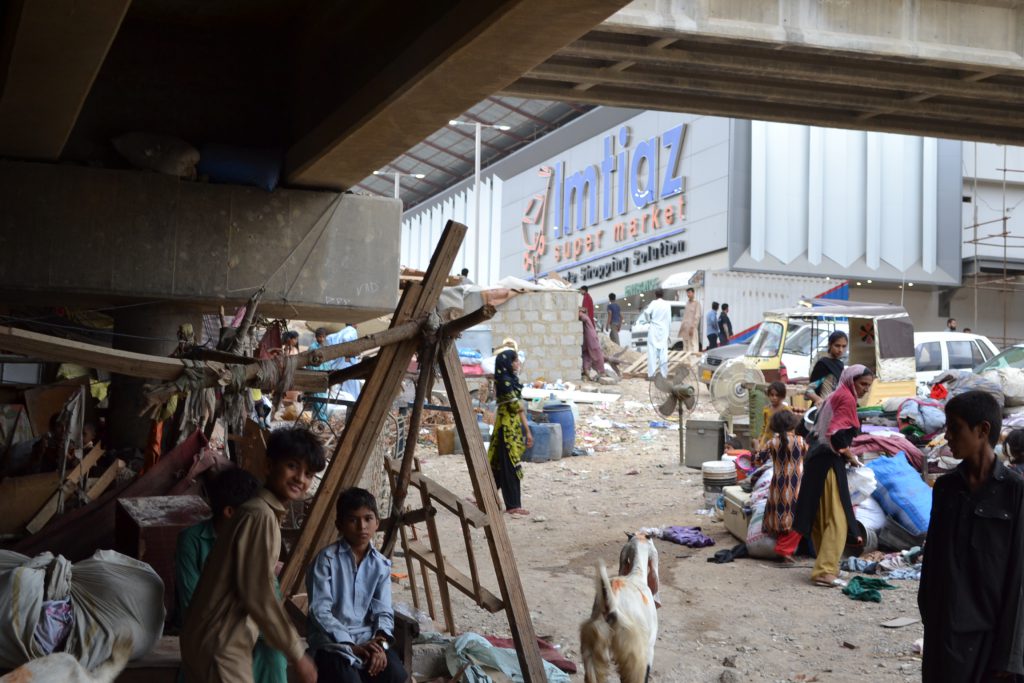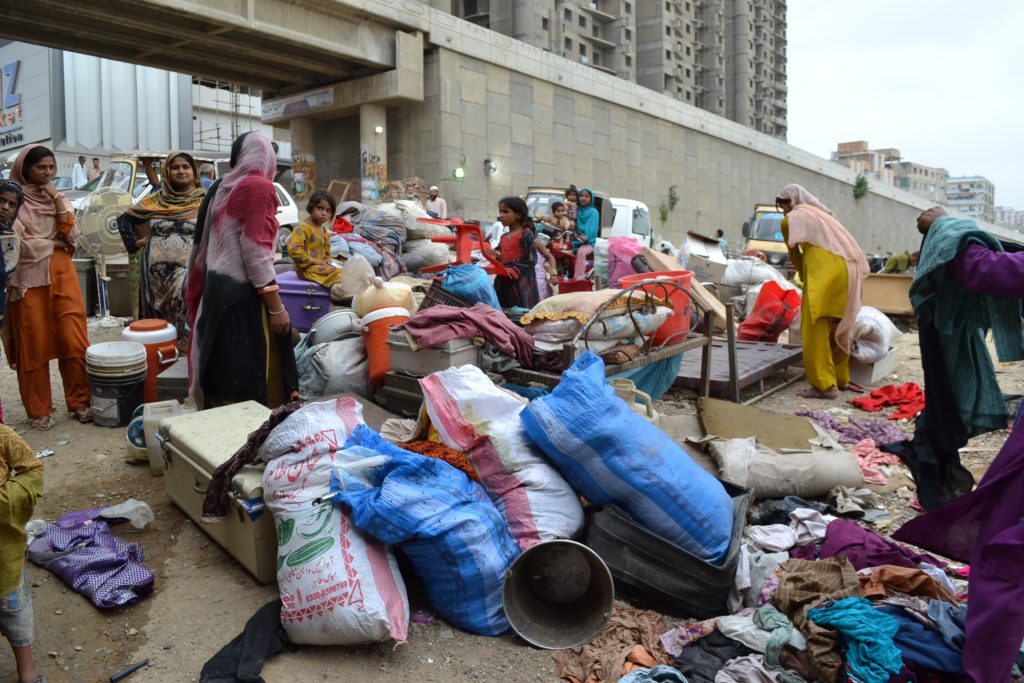Azra Talat Sayeed, Roots for Equity
July 13, 2016
In Pakistan, the word climate change-related disasters are generally related to upheaval of rural communities, especially riverine communities. However, what has happened today in a squatter settlement of Guslhan-e-Iqbal, Karachi belies this belief. National Disaster Management Authority (NDMA) on July 10, issued a warning about the “weather in Karachi and Coastal Areas of Sindh.” Though the warning did not state what kind of ‘weather’ the citizens of Karachi were to expect, the result was that officers from District Commissioner offices were demanding squatter settlement communities living along sewerage flows/water canals to evacuate the area. Today (July 13, 2016) a number of senior official with police escort came to this particular squatter settlement (generally known as kacchi abadi) living under bridge that is passing under the Northern Bypass Bridge on Rashid Minhas Road in District East, Karachi, near Moti Mahal and just a stone’s throwaway from the very recently opened Imtiaz Super Store.
The police destroyed a temporary abode of a family that was in front of a major sewerage pipeline and other squatters (after much pleading) were given three hours to evacuate – they were threatened that the police and District East officials would return at 6:30 pm and at that time if the squatters were still there, their belongings would be bulldozed and they would be forcefully evacuated. The families were forced to pack their very meager belongings – the women, a majority of whom were domestic servants in the homes around the abadi running in every which direction searching for a shelter for their children at least for the night; a woman among them worried about keeping her children’s school books in a safe place; another on her way to storing her sewing machine and her daughter’s trousseau in her malikan’s (employer) home if she would allow her to do!
No doubt, the evacuation being demanded was fair and in preparation of possible flooding of the sewerage canals and the small stream highly polluted with very toxic-looking effluent flowing through it. However, the abusive behavior and show of force was not at all needed. But the hallmark of authority in Pakistan is of course first verbal abuse, and if need be, physical abuse.
However, our focus is not only on the atrocious behavior of our so called government servants, who are paid to serve us, the people of this city; The question is that why are so many people living in kachi abaids. Why have these families living in such inhuman, abysmal conditions? Where did the y come?
Almost every family in this abadi is a rural migrant from the Rahimyar Khan District in Punjab having migrated to Karachi in search of work. Most of them are landless agriculture workers who due to very poor enumeration of their work end up in Karachi. According to the women in the abadi, hardly anybody has any land. Of the 20 families, 2 families have just one or two canals (1 acre has 8 canals). Ghafurra, a domestic worker explained that even when families work as agricultural workers, they get paid seasonally. So, no doubt there is wheat stored at home but there is nothing else to eat apart from roti. According to her “there is no money to buy vegetables or any other stuff for food till the next season.”
After wheat harvest, the next crop would be cotton picking which would be six months away. Sugar cane stands for 12 months so this crop only provides mazdoori (labor) once a year. One family has just come to this settlement– about 15-20 days ago, they had sown moong dal (lentils), which got washed away with the current floods. This family is suffering from hunger. We asked the families if they have such shortage of cash how do they find the money to travel from Rahimyar Khan to Karachi? One family had sold their donkey to pay for the travel expenses.
Others sell stored wheat that they have earned during the wheat harvest. It was also explained that daily expenses are also met by selling small quantities of wheat during the ‘no work’ season. This is the basic reason that these families come to Karachi in search of whatever work they can find. One woman who has recently come to Karachi has been telling the families here that they are lucky to have cooked meals every day. According to her “we only subsist on roti – even vegetables are hard to access as they cost money.”
Even in the extremely abysmal conditions of this community, it is important to point out that the patriarchy is rife and the burden of providing for the families, particularly the children is with the women. Almost all of them are working as domestic servants, therefore basically living a life of toil and abuse hour by hour. It was clear that the food in this abadi of which a recent rural migrant was so envious of, is dumped food from the homes where these women spend their day cooking, cleaning and washing.
A woman told us that even when the police was in their area threatening to throw away their things, her husband was on his way to Rahimyar Khan, for some family business; she had entreated him not to go at least till this issue was settled but to no avail. She has seven children whom she is putting through schooling by working almost 10 hours a day – backbreaking work of sweeping and mopping at least 4-5 homes daily. She told us “a small room which would include a kitchen and the washroom would have to paid Rs 6,000 in rent per month. Where would I pay for the rent?” For two hours of work daily she gets paid Rs 3,500 in one home – and in the whole month is only able to earn no more than Rs 14,000. If she pays Rs 6,000 for rent how would she pay for the family’s food, schooling, other expenses? Another woman is living with her daughters. Her husband has divorced her because she had given birth to only to daughters. So each woman has a story to tell. Each story has its root in the oppressive systems of feudalism, capitalism and patriarchy.
The living conditions of the kachi abadi are beyond belief. The Karachi municipality has not been recycling garbage for the past months and a huge garbage dump is just next to the unkempt ‘homes’ under the bridge. The closed in space was causing the place to stink even more so as the air was dank and stale with no sunlight reaching the area even during the day. The small ‘stream’ is a black colored flow of effluent most probably carrying waste from factories and homes – the area was invaded by an awful smell – from the garbage, sewerage lines and of course the evil looking flow of water. Flies were like small pellets covering nearly every surface, swirling up and about like small whirlpools. And against this backdrop of extreme poverty – next door was the massive Imtiaz Super Store – thank you Globalization – just opened a month ago.
The area was full of private security – there to make sure that their customers had no trouble in accessing parking. There was a good stretch of area just in front of the abadi which would have a been a much better place for the abadi inhabitants to avail themselves of – but of course they knew very well that if they tried to sit there – they would be immediately removed. Such is the stinking class system of the ‘civilized’ society we live in. It is okay to live in rabid holes – for which these families pay bhata (bribe) to certain groups but not okay to live where they would get away from the stinking stream, the garbage, their children partially safe from falling into the polluted water. One woman mentioned that they were able get water from the nearby apartments but after Imtiaz Store has been operational – the store authorities have are not allowing them to carry water across.
In short, the working class of this country is constantly thrown from one end to another – all this because our feudal landlords have control over land and are living like the nawabs of the Mughal Dynasty – of course all thanks to the British Colonizers – our government in cahoots with the feudal landlords unwilling to carry out equitable land distribution; under the atrocious arm-twisting by the IMF and World Bank policies, our government is unwilling to stand with its people and provide them with decent, regular job security, social welfare and social security.
This short case study showcases how in Pakistan, climate change impacts come ‘searching’ for the people and communities so far away from flood areas; as has been constantly detailed by peoples groups and organizations: climate change is the manifestation of the exploitation of our resources by capitalist systems of production and results in the poor being the frontline victims.
This case study highlights the sick manifestations of all the oppressive production and reproduction system: feudalism, capitalism and patriarchy. It portrays not only the living conditions of this kachi abadi; it is the story of thousands of squatter settlements in Karachi as well as all mega cities of the third world. All over the world, the worsening conditions of the people, the living misery of our people is due to the life-draining clamp of the rich and the powerful class of feudal landlords and capitalist who are extracting every cent of profit that they can by taking control of land and other resources leaving the people to scrounge for each meal that they are lucky to access for the day.
There is no doubt that the answer lies in politicized, organized communities willing to fight for their rights to life, living and dignity!


